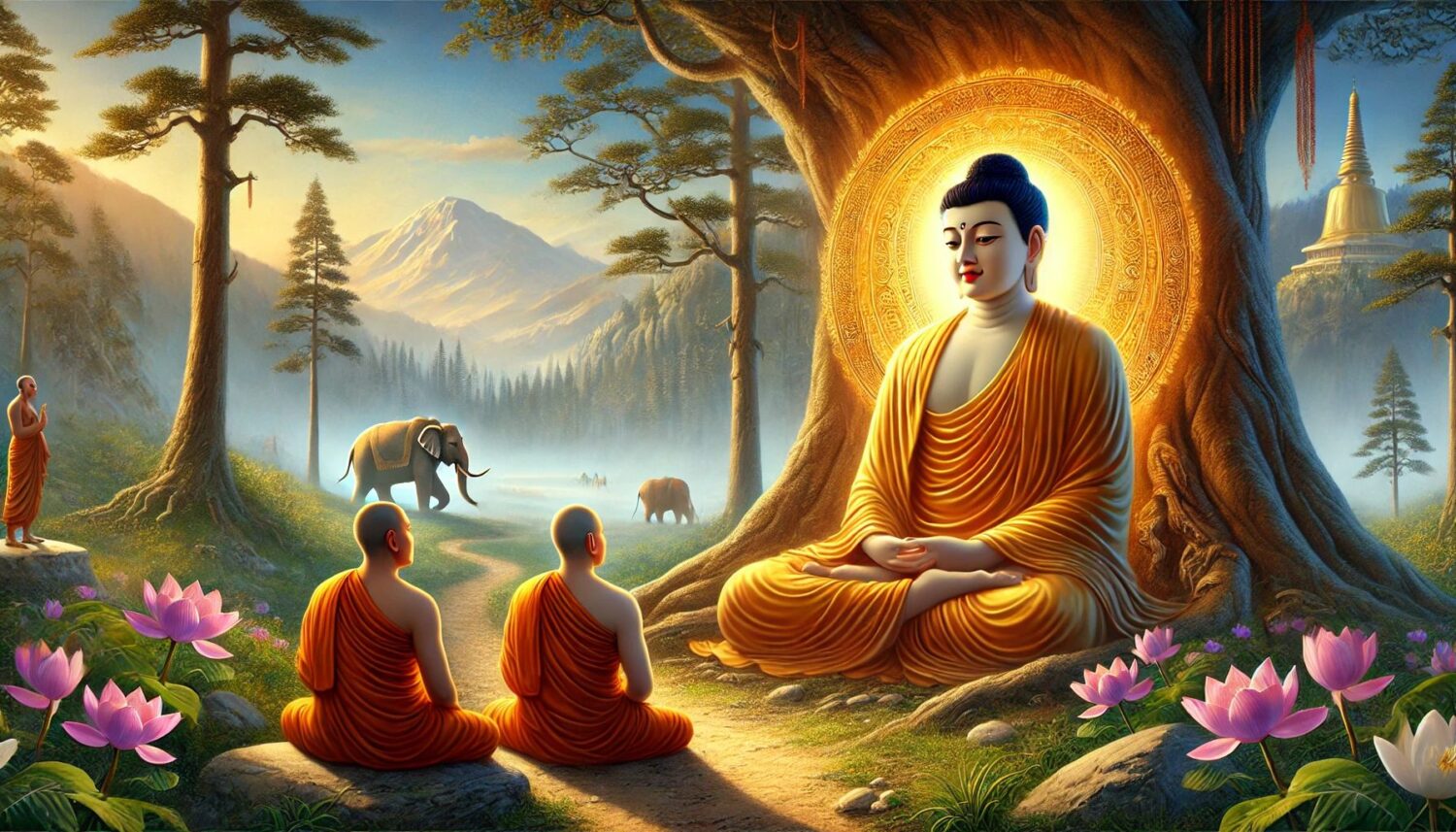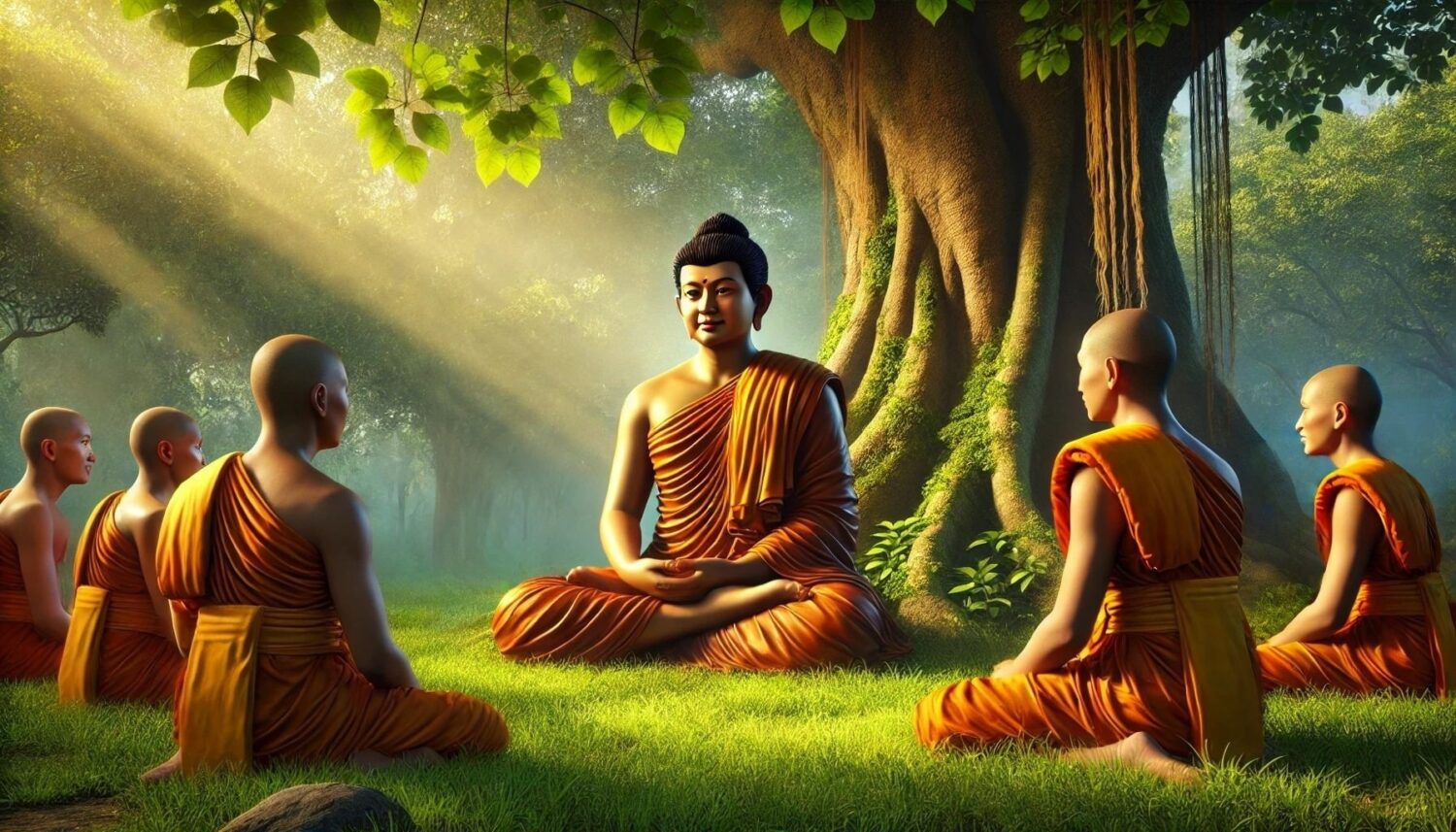
Date: 02/15/2025 02/16/2025
Location: Star Lake Meditation Center
Teacher: Shilin Long
Dharma Talk
King Chami and the Cobbler
Long, long ago, in an ancient age, there was a wise and diligent king who loved his people. He was known as King Chami because of his keen ability to perceive subtle truths. He devoutly believed in the Three Jewels and was cautious in his thoughts and actions, constantly contemplating and practicing the principles of the Dharma in his daily life.
One clear morning, after finishing a period of intense governmental affairs, King Chami dressed simply and strolled out of his palace for some fresh air.
The sky was just beginning to brighten. In the distance, a house had already opened its doors, and the sound of ding-ding, clang-clang rang out—the cobbler had begun another long and laborious day.
”Good morning, dear guest!” The old cobbler greeted him warmly, his voice still carrying traces of sleep.
King Chami sat down and, under the sparse morning light, began chatting with the old cobbler about all sorts of things. “Sir, in your opinion, who is the happiest person in the world?”
Still focused on stitching a shoe sole, the cobbler answered, “Of course, it’s the king!”
”The king? Why do you say that?”
Tapping on a shoe tip, the cobbler confidently explained, “The king has ministers who respect and flatter him, and the common people contribute everything they can. There is nothing he lacks—of course, he must be the happiest person in the world!”
”I see—” King Chami smiled as he reached into his pocket, pulled out an old bottle of wine, and shared it with the cobbler. Before long, the old cobbler was completely drunk and unconscious.
The king gently supported the drunken old cobbler and carried him back to the royal palace. The queen, upon seeing them, was astonished. “Your Majesty, who is this old gentleman?”
”This cobbler believes that a king is the happiest person in the world. I thought I’d play a little joke on him and let him experience it firsthand.”
The entire palace buzzed with activity. Some attendants bathed and dressed the old cobbler in royal robes, while others spread the news. The queen chuckled as she instructed the palace maids on how to act out the upcoming scenes, and the girls’ laughter rang like silver bells through the halls.
Yet, the old cobbler seemed entirely indifferent to the commotion. His round, ruddy face remained as peaceful as ever.
Finally, the “king” was seated upon the throne! Adjusting the heavy, ornate crown on his head and shaking out his grand, luxurious robes, the “king” sat uneasily on the elegant royal seat. The ministers entered, bowed in ceremony, and stood solemnly before him.
The “king”—who was, in reality, the old cobbler who had just woken up from his drunken stupor—was completely overwhelmed and had no idea what was happening.
A court maid, holding back laughter, solemnly announced, “Your Majesty, you have been intoxicated for several days. Documents have piled up like mountains. Please review them immediately and make your rulings.”
One by one, the ministers stepped forward to report, debate, and seek advice. The cobbler, whose mind was never particularly quick, now found himself in complete bewilderment.
”Your Majesty, shifting around so much is unbecoming of a king,” the historian noted.
”Your Majesty, your decision regarding children’s welfare is illogical—how exactly do you expect kindergarteners to participate in a ‘national shoe-repair movement’?”
”Your Majesty, you’re holding the documents upside down,” the secretary reminded.
”Your Majesty, napping in court is inappropriate,” the historian added another note.
”Your Majesty, as a king, you must not use crude language. You should refer to yourself as ‘We’ rather than ‘I,’” the policy advisor handed him a note.
”Your Majesty, you—”
”Your Majesty, I dare to offer counsel—”
Sitting on this throne of grandeur was far from easy!
By the end of the day, the “king” was exhausted—his back ached, his head spun, and his body felt sore as if he had been beaten. Yet, the pile of documents remained as high as ever.
Time dragged on, and the days felt like years. Though each moment was unbearable, time still moved forward.
One day, as a palace maid served his meal, she noticed that the “king” was growing thinner and thinner. Concerned, she asked, “Your Majesty, you were once full of energy. Why have you become so weary?”
The “king” straightened himself, sat properly, and replied with serious composure, “We have been dreaming of being a lowly cobbler. Life was hard—full of toil and suffering, with barely enough to eat or wear. The hardship gave Us a terrible headache!”
At that, the ministers could no longer contain themselves—they burst into laughter.
The “king’s” face turned bright red, but his expression grew even more solemn.
That night, the full moon shone high in the sky, casting its silver light through the palace windows onto a sleepless face.
”Who am I?” A question he had never considered before suddenly arose in his mind and refused to fade. “Am I the cobbler? Or am I the king?
”If I am the king, why is my skin rough and calloused? If I am the cobbler, why do I sit on the throne and govern the kingdom?
”Am I the king? Am I the cobbler? My mind is in chaos. My old eyes are dim. Two identities—yet which one is real?
”Who? Who am I?”
The cobbler—perhaps now the “king”—or was it still the old cobbler? Regardless, he was exhausted. He drifted into a deep sleep.
The queen gazed at the old man. He had grown thinner. A faint, almost imperceptible layer of dust seemed to cover his simple, honest face. Yet, beneath that, there was an unmistakable glow of wisdom.
”Musicians, play a joyful tune! Let the king be merry once again!” The queen commanded.
Cup after cup, the cobbler was given wine. As the alcohol clouded his senses, the world around him faded into oblivion.
”Am I home?”
The rough ceiling of his little wooden hut came into view. His coarse bed, the dusty toolbox, the scattered shoe orders, the new and old shoes strewn across the floor.
Sitting in his humble home, the cobbler couldn’t help but doubt—where was home? Who was he?
Feeling the rough cloth of his tunic draped over his shoulder, his dazed eyes suddenly flickered with clarity.
”Good morning, dear guest!” The old cobbler grinned, warmly greeting the familiar tall man before him.
King Chami, smiling, observed a “king” who looked exactly like himself.
And once again, the two of them talked about the world, from every corner of the earth.
”You know,” the cobbler said, gazing seriously at King Chami, “that day when we drank together, I was so drunk that I just woke up the day before yesterday. I had such a long dream! I dreamed that I had become a king…”
”Look at this stitching—does it hold well? Oh, let me sew a few more stitches—being a king, oh, it’s tough! Going up to court, coming down from court, being scrutinized by historians, questioned by ministers—every single word and action had to be flawless. I was so tense all day that my body ached like I had been beaten.”
”Ah, here, have some vegetarian food. No need to be formal—we are brothers, after all.”
”The pain was unbearable; it almost killed this old man. Good thing it was just a dream! But if even a dream was so tormenting, what if it had been real…? Oh, here, have some more food, try this.”
”Last time, I told you that the king was the happiest man in the world. That was probably just my imagination…”
Life is but a dream. The endless cycles of rebirth are the same. The mind that is clear, aware, and in control is like a king, ruling with wisdom, while the mind that is confused, deluded, and lost is like the cobbler, endlessly drifting through suffering.
A single thought creates joy and suffering alike. Which identity is real? If one truly understands, one will find complete peace and equality in all things.

